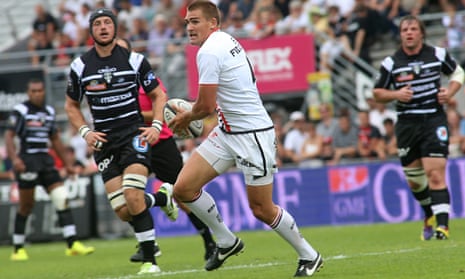One of the great delights is to watch English sides go well in Europe. Last season not much bettered Saracens coming of age when they beat the mighty Clermont Auvergne 46-6. A six-try mauling that set the blood coursing, unfortunately matched on the emotional rollercoaster by defeat in the final four weeks later.
Even though Jonny Wilkinson ended his remarkable career with back-to-back titles, it didn’t come close to easing the national pain which marked a seventh season since an English club laid hands on the trophy. So what is there to decry in this week’s announcement of a rise of the salary cap by £500,000 to £5.5m, which may go some way, but only some – remember Toulouse have a budget of €35m (£27m) – to levelling the playing fields of Europe?
It’s long been the complaint of the likes of Leicester, a great club but one whose last European title was 12 seasons ago, that French spending power was denying them the chance of buying the best while losing the likes of Toby Flood to the Top 14. And that is before you figure in the temptations that Japan offers a “mature” player with its rich salaries and ridiculously limited playing demands. So what’s not to like about an enhanced salary cap?
Well, I just have this niggling worry that it might be a step along the path to harming something which is pretty good.
Just look at this season. Round one: Northampton take Gloucester apart, looking like the champions they are, then visit Wasps, an improving side but one who needed a decent scalp, and lose. Admittedly the margin of victory was slim, but it reinforced the suggestion of last season that on any given day, any club could beat any other in the Premiership.
It is one of the joys of English rugby and if, perhaps, not quite on a par with Saracens-Clermont, it has helped push up attendances and television revenues, creating the extra cash which allows the cap to be raised. So far, so good. But I wonder just how many of the 12 clubs in the Premiership will use that extra spending power. My guess is fewer than half.
Here’s some of the evidence. The argument between the haves and have-nots famously boiled over last season when Steve Diamond and Richard Cockerill, the splendid directors of rugby at Sale and Leicester respectively, went head to head, Cockerill accusing Sale of “cheating” in the scrum and Diamond accusing the Tigers of spending between “£6m and £7m” – well over the allowed £4.26m.
“I know what players’ earnings are,” said Diamond. “You can’t put a round plug in a square hole, but some clubs manage to do it. If I was an amateur magician even I couldn’t do that.”
Colourful stuff and a few days later Simon Cohen, Leicester’s chief executive, admitted that Diamond had a point. While emphasising that Leicester stuck by the letter of the law, Cohen agreed they could be spending possibly £1m more than Sale, and probably more than any Premiership club, because “we are the only team that uses all of its allowances [in and around the standard £4.26m cap] up to £5.1m.”
Cohen also agreed that Leicester spent heavily on medical, conditioning and support staff, thus making the club attractive to would-be signings and improving their chances of winning something and playing international rugby.
Since then Sale, a good club whose sixth place last season has been rewarded by facing Clermont, Munster and Saracens in the pool rounds of the Champions Cup, have announced pre-tax losses for another year. Leicester, one of the financial powerhouses, continue to make a profit but, nonetheless, Cockerill is against this week’s deal, or the aspect of it which particularly worries me – the £500,000, in addition to the cap, for a second marquee player.
Like Cockerill, I really don’t like the idea of a short-term fix: a player coming into the Premiership after the World Cup and staying only as long as it doesn’t damage his chances of appearing for his country at the following World Cup. That should not be what growing a side is about and I would argue that it’s more likely to bring about the first million-pound player in this country than promote harmony within the ranks of clubs who have found that good academies and age-group structures are more important.
Harlequins, for example. They already have a marquee player in Nick Evans, but he assumed the title by being around when the current allowance was created and I doubt whether Conor O’Shea, Harlequins’ director of rugby, would be in the market for a second marquee player were it to risk disrupting the conveyor belt which, along with some clever buying, has produced talent at the Stoop.
So, if only half the teams in the Premiership are likely to use the extended salary ceiling then I guess even fewer – possibly only a quarter – would go for a high-rolling second star, and here we come to a less visible point. The rules that govern that spending – no player can be bought who is already in the Premiership – in effect ringfence the talent which the rich clubs already have.
Likewise the change in what were “academy” credits to “homegrown” credits – a rise from £30,000 to a maximum of £400,000. This is intended to keep homegrown talent from going abroad, but because there is now no upper-age limit, it also serves to restrict movement, thus further underpinning the lot of the powerful.
As I say, this is the detail. It’s a question of balance. An English triumph in the first season of the European Champions Cup is something we all crave, but we must also be aware of the price we might pay.

